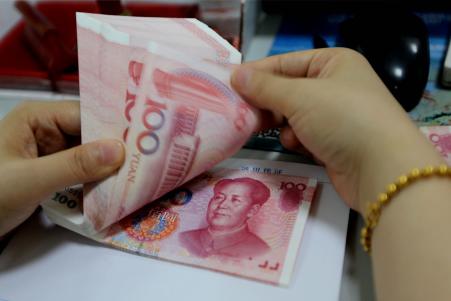By Avaneesh Pandey -
As the yuan fell for the third straight day on Thursday, the People’s Bank of China (PBOC) said that the currency would strengthen again once markets stabilize, adding that there is “no basis” for further depreciation. At a press conference in Beijing, central bank officials also dismissed speculation of a future currency depreciation of 10 percent as “groundless.”
“A rigid yuan exchange rate is not suitable for China,” PBOC Deputy Governor Yi Gang reportedly said at the press conference. “The central bank’s goal is to let market decide Chinese currency’s exchange rate and the PBOC has withdrawn from regular intervention in the foreign exchange market.”
However, Ma Jun, a PBOC economist, told China’s state-run Xinhua news agency Thursday that the central bank is still “fully capable” of stabilizing the exchange rate through direct intervention in order to “avoid herd mentality resulting in irrational movements of the rate.”
Following Tuesday’s “one-off depreciation,” which left the yuan almost 2 percent weaker against the U.S. dollar, the PBOC has lowered the midpoint rate twice. Thursday’s midpoint rate was set at 6.4010 per dollar prior to market open -- a drop of 1.1 percent from Wednesday’s 6.3306 and lower than the day’s close of 6.3870.
According to unnamed sources cited by Reuters, several major state-run banks had been buying yuan and selling off dollars Wednesday to prop up the currency, resulting in the exchange rate to recover sharply during the last few minutes of trade.
The decision to devalue the currency has been widely attributed to a drastic slump in Chinese exports, which fell 8.3 percent over the past year in July. While a weaker currency is likely to help China’s exporters, the cuts have put financial markets on edge and sparked fears of a currency war of sorts as other countries -- especially those that compete against China in global markets -- feel pressurized to devalue their currencies.
“Currency depreciation is not necessarily good for a country. It increases the cost of imports, which if used to produce exports would make exports less competitive, as well as the burden of repaying foreign debt,” Linda Lim, a professor of strategy at the Ross School of Business at the University of Michigan, said, in an email to International Business Times. “At best there may be a short-term boost to export competitiveness.”
Addressing concerns over an increase in capital outflows following the devaluation, PBOC officials said they would monitor the situation to ensure “orderly” cross-border capital flows, according to media reports. Following the press conference, the Shanghai Composite Index was trading up 1.3 percent, while the smaller Shenzhen Component index was up 1.9 percent.
Meanwhile, the Korean won was down 1.4 percent while the Indonesian rupiah was down 0.32 percent and the Thai baht was down 0.26 percent. On Wednesday, the Indian rupee fell to a two-year low following the yuan depreciation, and had regained some ground Thursday to trade about 0.18 percent up. The Vietnamese dong was up 0.28 percent a day after the country's central bank acted to "ensure the competitiveness of Vietnamese products."
